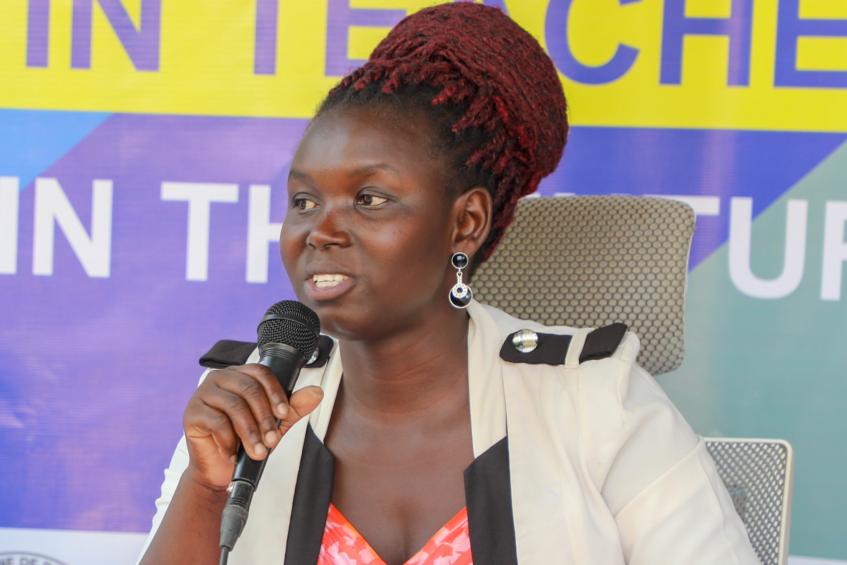
Tabu Monicah Morrish teaches in Godo Primary School in Juba County, Central Equatoria State - May 26, 2023 - Credit: Moses Awan/Eye Radio
Low pay is causing female teachers in primary schools to consider leaving the teaching profession, one of the female teachers has said.
Tabu Monicah Morrish, a female teacher who teaches at Godo Primary School in Juba County says there are few female teachers in the profession because of low pay.
She raised the concern during the education roundtable discussion of the importance of teachers and seeking possibilities for addressing the challenges hindering the education sector.
The roundtable also aimed to determine the progress of regular and timely payment of salaries for the teachers of South Sudan and ensure they are well trained.
It is centred on how UNICEF and its partners can work with the South Sudan government to uplift the standard of the education system.
The discussion brought together key education partners including senior government officials, development partners, and relevant stakeholders.
Monica pointed out that some cultural norms orchestrated by some communities continue to deprive girls of getting access to education, leading to a low number of female teachers.
She calls on the government to raise the salaries of teachers and improve their resident quarters to motivate in order to attract many to the career.
“In many communities in South Sudan including the community that I come from, girls are not sent to schools because they believe girls are sources of wealth,” said Monica.
“Once you reach reproductive age, you have to get married and bring cows home or money,
“Why there are few female teachers in the primary schools is because of the little salaries that they get”.
Whereas Jimmy Kenyi, another teacher who has been in the profession for about 15 years says despite efforts exerted by teachers, insecurity continues to demoralize many in several parts of the country.
He calls on the government to ensure school feeding programs are implemented to keep children at school.
“Issue of insecurity I felt it myself. We always teach in the class knowing very well that our country is not stable politically, all teachers and learners, their eyes and ears are rather up,” said Kenyi.
“Anything like the sound of a gun from nearby the teacher and the children run away, know it is dangerous. Sometimes our lessons are interrupted because of all these.”
Responding to the concerns, the Ministry Undersecretary, Kuyok Abol Kuyok says the government has planned to prioritize the needs of teachers in the country through improved pay.
He discloses that, out of the 64,000 teachers in the country, about 20% of them are permanently employed with the rest volunteer.
According to Kuyok, the Ministry of General Education and Instruction has had increased pay in the government budget allocation that has enabled them to improve the welfare of teachers.
He says, out of the total budget, about 80% of that is directly channelled to the State ministries to support learning programs and teachers.
Teachers are not getting salaries because States use the money for their own.
Now, the ministry channels the money to the State Ministry of Education and not the Finance Ministry however the money is not enough given the current state of the economy.
The government is working to increase the pay to allow them to sustain themselves and their families.
“There has been a significant improvement in allocation to education. Last year, for example, it was 12 and a half per cent of the overall budget. This year, we are aiming at 17%, which is still below the international benchmark,” said Kuyok.
“88% of this budget is transferred to the states and it mainly goes for teachers’ salaries”.
For her part, UNICEF Chief of Education, Wongani Taulo said there is a need to invest in teachers so that they spend more time with children.
She says this is because they instil the values of the country and any other critical elements in the lives of children.
Taulo calls on the government to define a clear path to attract many teachers to join the profession.
However, Taulo has commended the positive trajectory of the government in enhancing the capacity of the teaching force after it increased the allocation of budget and cash transfer to support schools in the States.
Taulo says with support from European Union, UNICEF is training teachers in hard-to-reach areas to continue providing educational services within their vicinities.
She also added that UNICEF will continue to work with the government to elevate the capacity of teachers to boost learning across the country.
“We don’t want to entrust our children with teachers that we don’t have confidence in because these teachers are shaping the values of these children and entail the values of the country and any other critical element of their lives,” said Taulo.
“The ideologies that they teach in school can shape what the country becomes,
‘It is critical that we invest in these teachers because they are the ones that will inspire our children to realize their full potential”.
Support Eye Radio, the first independent radio broadcaster of news, information & entertainment in South Sudan.
Make a monthly or a one off contribution.
Copyright 2024. All rights reserved. Eye Radio is a product of Eye Media Limited.